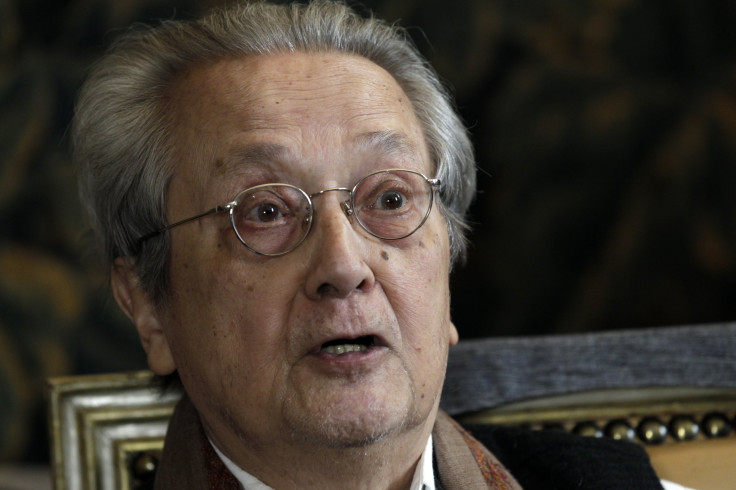Jacques Verges, Defender Of Mass Murderers, Nazi War Criminals, Communist Terrorists, Dies In Paris

Jacques Verges, the controversial French attorney who represented some of the most notorious figures of the 20th century, has died in Paris from a cardiac arrest at the age of 88. Known as the “Devil’s Advocate” or the “Terror Advocate,” he had a grim list of clients that included Nazi war criminal Klaus Barbie and Marxist terrorist Carlos the Jackal. During the 1950s, Verges, a devout anti-colonialist, also defended Algerian terror suspects who had committed acts against France.
Verges’ death took on an unusual symbolism in that he expired in the bedroom that once belonged to Voltaire, the 18th-century French philosopher who criticized the establishment. "[Voltaire’s bedroom] was an ideal place for the final dramatic act of this born performer,” said Pierre-Guillaume de Roux, the editor of Verger’s memoirs, "De mon propre aveu" [“From My Own Admission”], according to BBC. "Like Voltaire, he cultivated the art of permanent revolt and U-turns.''
Verges came from a wildly exotic background – he was born in 1925 in Ubon Ratchathani, a city now in Thailand (but then part of the Rattanakosin Kingdom) to a French diplomat father, Raymond Verges, and a Vietnamese mother. Subsequently, he grew up on the island of Reunion, a French possession in the Indian Ocean, where he developed his strongly anti-colonialist views.
After service in the Free French Resistance of Gen. Charles de Gaulle during World War II, Verges became a leading member of France’s Communist Party. While studying the law in Paris, he met and befriended Pol Pot, the Cambodian who in later decades would commit genocide in his homeland under the brutal Khmer Rouge Communist regime, killing more than 2 million of his own people.
By the 1950s, as Algerians fought for independence against French rule, Verges took on the cases of Algerian nationalists accused of committing terror acts against the French state. He even married one of his clients, an Algerian woman and guerrilla fighter named Djamila Bouhired, who was sentenced to death by guillotine in 1957 for placing bombs in cafes in Algiers. Verges eventually won her release, but reportedly he himself became a target of assassination by right-wing French nationalists.
In subsequent decades, as Verges’ profile grew, so did his notoriety – he defended a long line of questionable characters across the ideological and geographical spectra, from Ilich Ramirez Sanchez, the Venezuelan Marxist revolutionary terrorist better known as “Carlos the Jackal,” to Klaus Barbie, the French Nazi Gestapo officer who was labeled the “Butcher of Lyons” and brought back to France from South America to stand trial. (Both Carlos and Barbie were convicted). Considering that he and Barbie stood at opposite political and ideological poles during World War II, Verges told Reuters: "If he had been at the end of the barrel of my gun, I would have shot him. Now I am simply doing my job as a lawyer."
Verges also defended left-wing terrorists and hijackers during the 1960s and 1970s, including Palestinians who were charged with seizing Israeli aircraft, as well as members of Germany’s Red Army Faction (aka Baader-Meinhof Gang) who were charged with various bombings. Linked to his earlier friendship with Pol Pot, Verges defended Khieu Samphan, an ex-head of state of the Khmer Rouge, during the genocide trials in Cambodia.
Verges also once offered to defend suspected Serbian war criminal Slobodan Milosevic, who turned down his request. He also proposed defending Iraqi strongman and mass killer, Saddam Hussein. "When a wanted man knocks on my door, for me he is always a king in his misfortune," Verges once reportedly declared.
Verges, admired for his brilliance, nonetheless baffled and enraged many observers by defending despicable clients that no one else would. He was also a mysterious character who disappeared from public view for a few years in the 1970s and was accused of having links to intelligence agencies, terror networks and Chairman Mao Zedong of China. “He’s a slippery man,” director Barbet Schroeder, who made a documentary about Verges called "Terror’s Advocate," told the New York Times in 2007. “You can never touch him. He loves the mystery. The reason is that there are certain things he cannot talk about. He would be in deep trouble if the truth came out.”
Verges himself once explained his philosophy to the Times: “I practice the ‘defense de la rupture’. My law is to be against all laws. My morality is to be against all morality.”
© Copyright IBTimes 2024. All rights reserved.





















